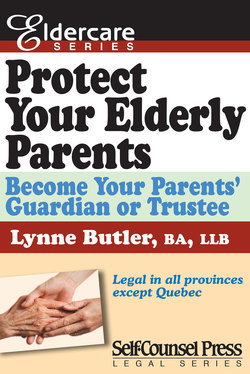Читать книгу Protect Your Elderly Parents - Lynne Butler - Страница 35
На сайте Литреса книга снята с продажи.
7. Enduring Power of Attorney
ОглавлениеLike the Health Care Directive, an Enduring Power of Attorney is a document that is signed by the elderly relative, usually long before it is actually needed. Note that an Enduring Power of Attorney is different from a regular Power of Attorney that is often used for business and banking. An Enduring Power of Attorney is specifically designed so that it can be used even though the person who signed it has lost his or her mental capacity. In Ontario, it is referred to as a Continuing Power of Attorney for Property and the word continuing has the same meaning as the word enduring.
The Enduring Power of Attorney names a person to be the elderly relative’s spokesperson (referred to as his or her attorney). It also gives the attorney the authority to deal with the relative’s real property and personal property. Most of these documents give a blanket authority so that the attorney can do anything that the relative can legally do with his or her property, subject to certain restrictions. Because the document was signed by the relative at a time when he or she had mental capacity, the document reflects the elderly person’s wishes about how he or she wants his or her property dealt with while alive.
The kind of decision that may be made by an attorney under an Enduring Power of Attorney roughly corresponds with decisions that can be made by a court-appointed trustee. In other words, the attorney can make decisions about money, sale or rental of real estate, or payment of bills, but he or she has no authority to make any decisions about health or medical care.
Again, as with the Health Care Directive, if the document is not already in place and your elderly relative has lost his or her ability to understand legal documents, it is too late to have an Enduring Power of Attorney signed.
